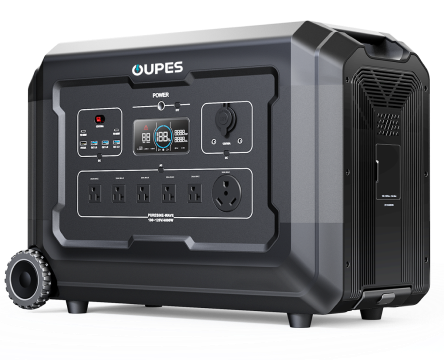When you are thinking of switching to solar power or even buying a backup generator, there is one question that crosses your mind: how many watts does your home need? It is not just a technical buzzword, but it influences your budget, comfort, and peace of mind in case of outages. Whether you are off-grid or you simply want energy security, the most intelligent thing to do is to know how many watts you need.
How do you do that? How can you know your overall wattage requirements?
In this article, we will answer this question and go through the wattage required by most houses, how to determine your energy consumption, and the smartest way to plan a solar or generator system that matches your requirements.
Why Knowing Your Home’s Wattage Needs Is Essential
By knowing the exact (or even estimated) power requirements, you can plan your backup power efficiently.
Falling below your power requirements will mean your appliances not running properly, and going above that requirement will mean higher upfront cost (with no ROI).
The power requirements for most homes are quite extensive, and depend on:
● Square footage
● Number of occupants
● Type of appliances
● Climate and insulation
● Energy habits (This is probably the most important factor)
An average small apartment would need 3,000-5,000 watts but a fully loaded, 4-bedroom house can use 20,000 watts or more - especially when you have central air conditioning, a well pump, and any other big-drain appliances.
And, don’t forget your energy habits. Are you frugal when it comes to running appliances? Or one of those people who go to their office, leaving the HVAC running? Your energy habits play an important role in your power requirements.
Understanding Power: Watts vs. Kilowatt-Hours (kWh)
To make a good plan, it is worth knowing the basics. A watt is the unit of power at any specific time, and kilowatt-hour (kWh) is the measure of how much energy your appliances are using over a certain period.
For properly sizing your solar or generator system, you need to be aware of how to calculate kWh (kilowatt-hours). The formula is as follows:
Wattage x Hours Used ÷ 1000 = kWh
Example: A 1,000-watt microwave used for 1 hour = 1 kWh. If used for 2 hours, that’s 2 kWh. Tha’t simple math.
Understanding how to calculate kWh helps you estimate your daily and monthly power usage. It's the foundation for any energy plan.
According to the U.S. Energy Information Administration, the average American household uses about 29.5 kWh per day.
What’s the Average kWh Usage Per Day?
No one can answer this question better than you. You know what you want to run, better than anyone else. However, here is how different types of households use energy per day (it's only an estimate):
|
Household Type |
Avg Daily Usage (kWh) |
|
Small Apartment |
8–15 kWh |
|
2–3 Bedroom Home |
20–30 kWh |
|
Large Home (2000+ sq ft) |
30–50+ kWh |
Your average kWh usage per day can provide the answer to the following questions:
● Whether you should consider battery backup or not
● How many solar panels should you use
● The size of the generator that can handle your load.
Whole House Generator Sizing vs. Solar Planning

Your whole house generator sizing is an important step in solar planning. When you want to run all the things at the same time, such as HVAC, lights, refrigerator and microwave, you might require 10,000-15,000+ watts.
Let’s say you would like to run:
● Refrigerator (800 watts)
● Microwave (1000 watts)
● Lights (400 watts)
● Sump pump (1500 watts)
● Central AC (3500 watts)
● Misc devices (TV, laptop, phone, router): 500 watts
Total Running Watts: ~7700 watts
Startup Surge Required: ~10,000–12,000 watts
When you are looking for solar generators online, you may be tempted to think that a 7500-watt generator is sufficient, but it might not be able to run all of your appliances.
Therefore, as a rule of thumb, when sizing a generator that will power a house, add 20-25% surge load. This is a critical point, most homeowners skip.
Solar Backup: Smart, Silent & Sustainable
Generators are excellent in case of emergencies, but when it comes to long-term savings and sustainability, a solar system with battery storage is the game-changer.
This study shows how our reliance has consistently increased on Solar and other renewable sources of energy in the past decade.

Companies like Oupes have led the market in this transition to green energy. We offer scalable solar generators with high-capacity lithium batteries so that you can tailor a system to your specific kWh usage.
Our systems are:
● Portable or whole-home ready
● Silent (no fumes or noise)
● Expandable with additional batteries or panels
● Compatible with solar + grid + gas input
Whether you're planning for a weekend camping or looking to power a 2000 sq ft home, Oupes lets you customize your setup without wasting power or money.
Best Generator for Home Use
Looking for the best generator for your home? Select one that has a balance of power output, portability, run time and fuel type. These are the options for you:
1. Solar Generator – This is perfect when you need high wattages and off-grid applications. Clean, silent and extendible.
2. Dual-Fuel Inverter Generators – If you find yourself in a location that experiences frequent outages and needs gas backup, then these are flexible.
So, which one is actually ‘best’? For anyone who likes a dependable, silent, environmentally friendly source of power, a solar generator is the option. But if you can survive the noise of a traditional generator, you can choose that too.
FAQs
What size generator do I need?
You would have to add up the wattage of all the devices you would like to operate and then add 20-25% headroom for surge power. For most medium sized homes, 7,000 to 10,000 watts is suitable.
How many watts does a TV use?
On average, an LED TV consumes 80 to 400 watts, although a larger screen and screen technology can affect this wattage range.
Will a 7500-Watt generator run an entire house?
Yes, for small houses or limited appliances (fridge, lights, fans, and so on). In big houses with central air or electric heat, probably not.
How big of a solar generator do I need for my 2000 sq ft house?
Plan for 20,000+ watt-hours of storage or a 5,000–10,000 watt solar generator with expandable battery capacity.
Conclusion
So, how many watts to run a home? It depends on the size of your home, the way you live and your power needs. The trick is to estimate your energy consumption, know about surge and running watts, and select a system that is flexible with your requirements.
There is no need to wait until the next power outage or utility price increase, make a smart decision and power your home efficiently.

































Leave a comment
This site is protected by hCaptcha and the hCaptcha Privacy Policy and Terms of Service apply.